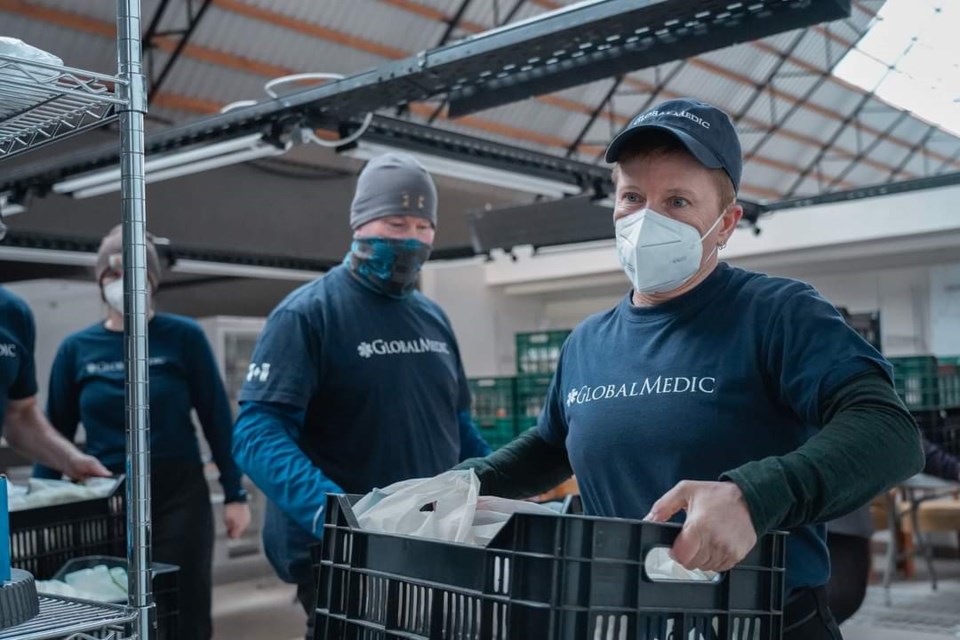Once a frontline worker, always a frontline worker.
Kathleen Doherty just returned from a three-week volunteer deployment to Moldova to support the refugees fleeing Ukraine in the wake of the Russian invasion.
The Midhurst resident retired as an Ontario Provincial Police staff sergeant in 2018 and was in the Canadian Coast Guard search-and-rescue before that, but admitted wanting to get out and help people where she could.
“I’ve always been an avid volunteer and it's my passion to pay it forward as best I can,” Doherty said.
In 2019, she was introduced to an organization called Global Medic, which provides disaster relief to large-scale catastrophes around the world and also provides humanitarian assistance to building programs in post-conflict nations.
Since then, Doherty has been deployed to the Bahamas in 2019 for Hurricane Dorian and Puerto Rico in 2020 for earthquake relief.
The call came for assistance needed in Ukraine after Russian forces had invaded and began bombing cites and towns, forcing many to flee to neighbouring countries for safety.
Doherty and another retired officer from Peel Region were paired together and landed in the battered European country early on March 4.
“We knew we were going to be there for about three weeks and so it moved very fast. We got there, met with the point person who helped direct us to everything and everyone we needed to know, and then you got to work,” Doherty said. “You have to quickly assess the situation, get the lay of the land and see what the No. 1 need is and how we can best help these people.”
There was a team in Romania by the border with Ukraine and others in Poland and other areas setting up 24/7 food kitchens.
Doherty said there are also major airline companies that donated flights and cargo, allowing the team to put together sea containers full of supplies that would get right into Ukraine where people need them most.
While the rest of the world watches from a distance and wonders what is happening and how bad it is in Ukraine right now, Doherty said it is “heartbreaking” to see the families trying to flee for safety.
“We had a team in Kyiv (where many battles are happening). It was important for us to remain at border areas. There were hundreds of people trying to get across, primarily women and children because the men had been conscripted to help fight,” she said.
“It was heartbreaking to see the poor mothers just exhausted from the journey and taking care of their kids carrying what they had.”
Doherty said the lineup to cross into Romania was sometimes eight to 10 kilometres long.
“We met up with a local church group, full of volunteers, who had scraped whatever money they could to try to buy food for the people as they waited and crossed the border,” she said.
While in Moldova’s capital city of Chișinău, Doherty said there were about 70 shelters built to help with refugees, but approximately 390,000 refugees came through to the eastern European country.
“You’re just going from shelter to shelter to see where the biggest need is for supplies like diapers, baby food, formula, hygiene products, you name it,” she said.
While the language barrier was definitely an issue, Doherty said government bureaucracy also didn't help.
“They’re told to open their doors and they will be paid for it, but half of them weren’t seeing any funding,” she said. “One hospital was an old COVID hospital that was made into a shelter for the women and children.”
Doherty also said there's a lot of division in the world, and especially in Ukraine, as Russia continues to bomb and try to take over the country, but she did witness good moments between people looking to help.
“The rural homes would take in like 10 people and even those living in apartments would say they could take maybe two or three people in," she said. "It's a little stressful knowing they need money and food to take on the extra people in their homes, but really inspiring to know folks were just eager to help."
Every trip that a Global Medic team goes to can be dangerous, but this mission had a heightened level of caution due to the invasion happening when Doherty and the others landed.
While it's hard on all involved, she said it was family supporting her that makes it easy to be able to continue paying it forward.
“One of the incentives to go was from my father, who passed away just before Christmas and was my hero. He taught me the importance of giving back and helping those who need it,” Doherty said. “Also, my partner and I have been together for 15 years and she knows how important my passion for helping is and has been a rock, and so supportive.”
Doherty admitted she doesn’t know how the Ukrainian situation will end, but has learned a lot about its people and what they’re capable of.
“They are such strong and courageous people. You wonder how they will bounce back, you look throughout history and they always do, and I believe they will be here again,” Doherty said.
While the invasion of Ukraine continues, Doherty said she's restless now being home.
“I just want to go back. You hear people complain about things in their life that seem so small in comparison and you just tell them they have nothing to complain about compared to folks over there,” she said. “We can choose what we say, what we eat, where we go, without any fear of repercussions or personal harm.
"It's good to be home here in Canada, but yeah, I just want to go back and help.”
